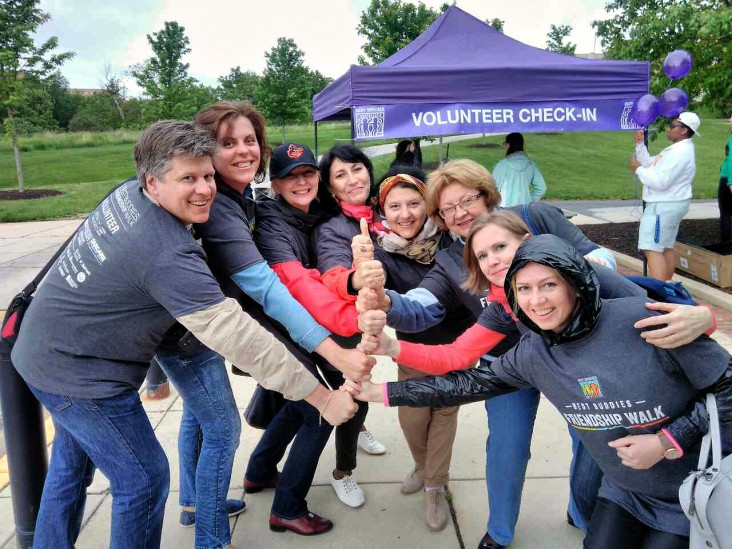Speeches Shim

THE CHALLENGE
The majority of civil society organizations dedicate most of their efforts and resources to maintaining their existing capacities with minimal focus on becoming more effective. Additionally, society lacks firsthand experience with using inclusive, participatory approaches to identify and address local issues.
PROGRAM OBJECTIVES:
- Enhance civic participation in social and economic decision- and policy- making
- Strengthen the organizational capacity of local CSOs
- Facilitate public-private dialogue on issues of local importance
OVERVIEW
USAID civil society development activities foster informed civic participation in community-based initiatives and public advocacy across the social and economic spectrum in Belarus. USAID empowers citizens to participate in social and economic decision-making by encouraging cooperation between civil society, local governments, and the private sector, helping to create sustainable solutions to local development challenges. USAID provides training, expert advice, and small grants to support civil society organizations (CSOs) and communities. Exchange programs introduce Belarusians to best American professional practices and offer opportunities to experience American culture, traditions and values.
OUR PROGRAMS
USAID promotes the development of civil society and participation in decision- and policy-making at the local and national levels via greater citizen engagement.
For over a decade, USAID has supported programs in civil society and community development. USAID programs strengthen local CSOs, as well as professional and local communities, to better serve the needs of society.
USAID aims to increase the sustainability of local CSOs, enhance their advocacy skills, promote sustainable development of professional and local communities, and improve the quality of services delivered by CSOs to beneficiaries and the general public. USAID programs empower local civil society actors to learn from each other’s achievements and challenges. Sakavitskiya Sustrechy (March Meetings) is a recently established civic forum to help activists from across Belarus share experiences and knowledge, showcase successes and strengthen networks.
Community initiatives and professional networks are supported through a series of activities, including roundtables and discussions, strategy development, training, study tours, community leadership training and small grants. The Community Development Fund (CMDF) supports CSOs and initiatives to develop communities and to address local communities’ issues.
USAID assists CSOs in building and maintaining open channels of communication with authorities at different levels to promote target groups’ interests, and have a voice in decision- and policy-making. Kastrycnicki Economic Forum (KEF), supported by USAID since 2013, is now enjoying wide donor and government support. Implemented by a leading local think tank, KEF is a cross-sectoral platform for dialogue and public communication about economic reforms in Belarus. KEF adds value to this dialogue through policy recommendations and action plans, helping to close the gap between policy and practice.
COMMUNITY CONNECTIONS
Community Connections (CC) is an exchange program that supports U.S. public diplomacy goals and builds and promotes mutual understanding between the American and Belarusian people. CC contributes to economic and democratic reforms by exposing Belarusians to American best practices and culture.
The program provides Belarusian professionals in business, education, law, civil society, and government the opportunity to gain practical experience from their American counterparts within their respective fields. The program lasts three weeks and includes site visits to American governmental agencies, businesses and CSOs. Each year, 60 or more participants representing different sectors take part.
PROGRAM HIGHLIGHTS:
Capacity Building for Civil Society Organizations
- This project supported the largest comprehensive, multifaceted training campaign for local CSOs in different areas of organizational development.
- From 2014-2017, representatives of 180 CSOs and initiatives were trained in CSO competencies, such as project management, human resources, financial management, PR, and volunteer management. CSOs completed over 9,600 hours of training and received over 2,538 hours of individual consultations.
- From 2014-2017, USAID supported two rounds of small grants competitions to support grassroots and experienced CSOs in implementing their plans of combining programmatic activities with strategic development. As a result, 24 local CSOs improved their organizational capacity, their collaboration with local authorities, and citizens’ access to professional and educational services.
- CSOs, with small grants support, organized 191 public events to serve their constituencies that included 5,866 participants, in addition to 138 internal events to strengthen their organizational capacity with the participation of 2,539 people. CSOs supported by USAID developed and introduced 47 new services, including online information resources, distance learning courses, new thematic components, and interactive activities with target groups.
- 312 CSO and civic group representatives in rural areas improved community development skills through workshops and consultations.
- 220 leaders of CSOs and grassroots initiatives as well as activists attended the March 2017 USAID-supported civil society forum in Belarus called Sakavitskiya Sustrechy (March meetings). The event promoted grassroots activism and the exchange of knowledge and experiences.
- From 2007-2014, USAID helped build a network of 13 university-based legal clinics that provide services for vulnerable groups, and developed educational materials that were disseminated throughout the country. Representatives of legal clinics completed over 3,400 hours of professional training and introduced seven new services for vulnerable groups , including small business law for low-income people, crime prevention education, social security law , and family law. These efforts enhanced their educational role and improved free services to vulnerable people. Annually, legal clinics provided over 1,200 consultations.
- In 2015, legal clinics created the first professional association for Legal Education Development. USAID also supported the Inter-University Clinic for continuous professional development for clinic curators.
Community Connections
Since 2006, 635 professionals have participated in exchange programs in the United States under this USAID-supported exchange program. Through these exchanges, participants learn innovative and best practices in topics such as: CSO management and capacity building; small business and local government; women’s empowerment; business and economic education; service provision for vulnerable populations; domestic violence prevention and countering trafficking in persons; volunteerism; environmental protection; and culture preservation.

Comment
Make a general inquiry or suggest an improvement.